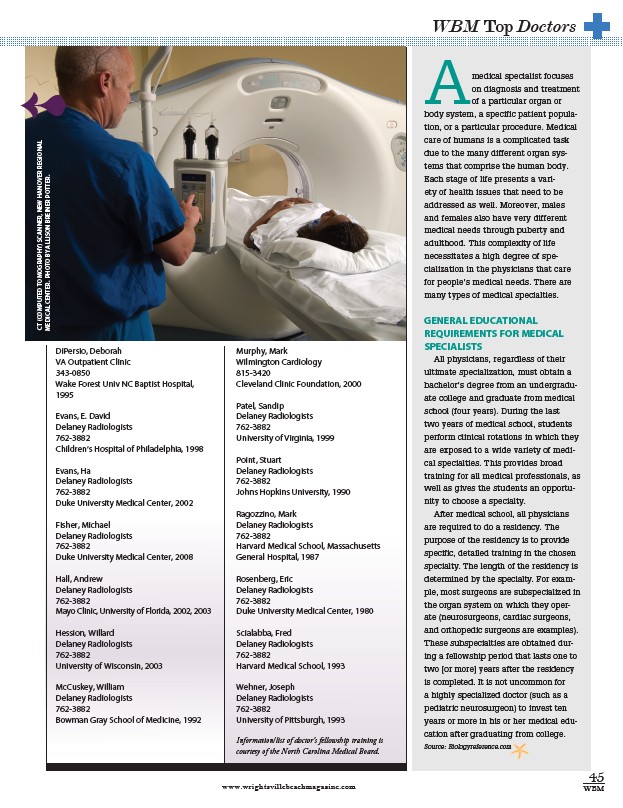
45
WBM Top Doctors
www.wrightsvillebeachmagazine.com WBM
DiPersio, Deborah
VA Outpatient Clinic
343-0850
Wake Forest Univ NC Baptist Hospital,
1995
Evans, E. David
Delaney Radiologists
762-3882
Children’s Hospital of Philadelphia, 1998
Evans, Ha
Delaney Radiologists
762-3882
Duke University Medical Center, 2002
Fisher, Michael
Delaney Radiologists
762-3882
Duke University Medical Center, 2008
Hall, Andrew
Delaney Radiologists
762-3882
Mayo Clinic, University of Florida, 2002, 2003
Hession, Willard
Delaney Radiologists
762-3882
University of Wisconsin, 2003
McCuskey, William
Delaney Radiologists
762-3882
Bowman Gray School of Medicine, 1992
Murphy, Mark
Wilmington Cardiology
815-3420
Cleveland Clinic Foundation, 2000
Patel, Sandip
Delaney Radiologists
762-3882
University of Virginia, 1999
Point, Stuart
Delaney Radiologists
762-3882
Johns Hopkins University, 1990
Ragozzino, Mark
Delaney Radiologists
762-3882
Harvard Medical School, Massachusetts
General Hospital, 1987
Rosenberg, Eric
Delaney Radiologists
762-3882
Duke University Medical Center, 1980
Scialabba, Fred
Delaney Radiologists
762-3882
Harvard Medical School, 1993
Wehner, Joseph
Delaney Radiologists
762-3882
University of Pittsburgh, 1993
Information/list of doctor’s fellowship training is
courtesy of the North Carolina Medical Board.
CT (computed tomography) scanner, New Hanover Regional
Medical Center. Photo by Allison Breiner Potter.
A medical specialist focuses
on diagnosis and treatment
of a particular organ or
body system, a specific patient popula-tion,
or a particular procedure. Medical
care of humans is a complicated task
due to the many different organ sys-tems
that comprise the human body.
Each stage of life presents a vari-ety
of health issues that need to be
addressed as well. Moreover, males
and females also have very different
medical needs through puberty and
adulthood. This complexity of life
necessitates a high degree of spe-cialization
in the physicians that care
for people’s medical needs. There are
many types of medical specialties.
General Educational
Requirements for Medical
Specialists
All physicians, regardless of their
ultimate specialization, must obtain a
bachelor’s degree from an undergradu-ate
college and graduate from medical
school (four years). During the last
two years of medical school, students
perform clinical rotations in which they
are exposed to a wide variety of medi-cal
specialties. This provides broad
training for all medical professionals, as
well as gives the students an opportu-nity
to choose a specialty.
After medical school, all physicians
are required to do a residency. The
purpose of the residency is to provide
specific, detailed training in the chosen
specialty. The length of the residency is
determined by the specialty. For exam-ple,
most surgeons are subspecialized in
the organ system on which they oper-ate
(neurosurgeons, cardiac surgeons,
and orthopedic surgeons are examples).
These subspecialties are obtained dur-ing
a fellowship period that lasts one to
two or more years after the residency
is completed. It is not uncommon for
a highly specialized doctor (such as a
pediatric neurosurgeon) to invest ten
years or more in his or her medical edu-cation
after graduating from college.
Source: Biologyreference.com